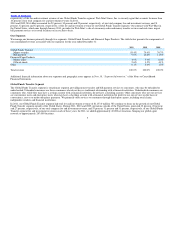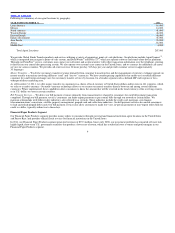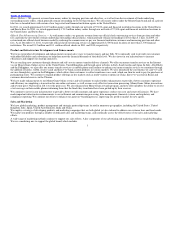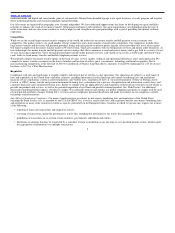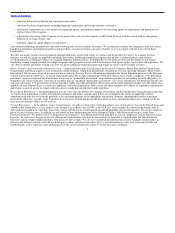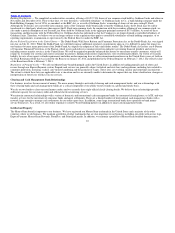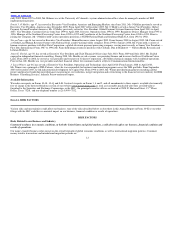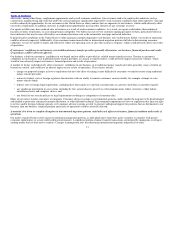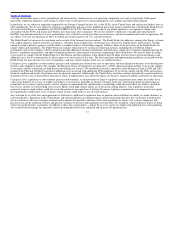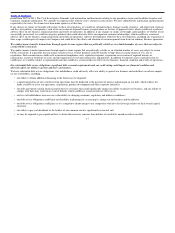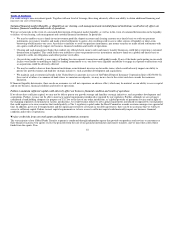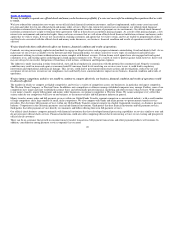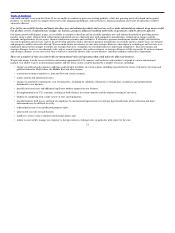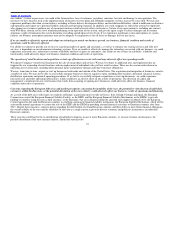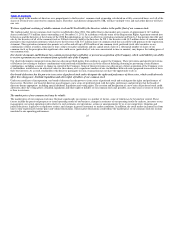MoneyGram 2011 Annual Report Download - page 16
Download and view the complete annual report
Please find page 16 of the 2011 MoneyGram annual report below. You can navigate through the pages in the report by either clicking on the pages listed below, or by using the keyword search tool below to find specific information within the annual report.
Table of Contents
evolving, inconsistent across various jurisdictions and often unclear, which increases our operating compliance costs and our legal risks. Subsequent
legislation, regulation, litigation, court rulings or other events could expose us to increased program costs, liability and reputational damage.
In particular, we are subject to regulations imposed by the Foreign Corrupt Practices Act, or the FCPA, in the United States and similar anti−bribery laws in
other jurisdictions. We are also subject to reporting, recordkeeping and anti−money laundering provisions in many jurisdictions, including the Bank Secrecy
Act in the United States, as amended by the USA PATRIOT Act of 2001. Because of the scope of our global operations, we experience a higher risk
associated with the FCPA and similar anti−bribery laws than many other companies. We are also subject to regulatory oversight and enforcement by
FinCEN. Any determination that we have violated these laws could have an adverse effect on our business, financial condition and results of operations. We
are subject to several investigations by the U.S. federal government and several U.S. state governments.
The Dodd−Frank Act increases the regulation and oversight of the financial services industry. The Dodd−Frank Act addresses, among other things, systemic
risk, capital adequacy, deposit insurance assessments, consumer financial protection, interchange fees, derivatives, lending limits, thrift charters, changes
among the bank regulatory agencies, and the ability to conduct business with holding company affiliates. Many of the provisions of the Dodd−Frank Act
require studies and regulations. The Dodd−Frank Act requires enforcement by various governmental agencies, including the new Bureau. Money
transmitters such as the Company will be required to provide additional consumer information and disclosures, adopt error resolution standards meeting the
Bureau’s regulatory requirements, and adjust refund procedures for international transactions originating in the United States. We may be liable for failure
of our agents to comply with the Dodd−Frank Act. The Bureau and the regulations it has adopted and will adopt will necessitate operational changes and
additional costs, but we cannot predict its effects upon us or our business at this time. The new legislation and implementing regulations associated with the
Dodd−Frank Act may increase our costs of compliance, and may require changes in the way we conduct business.
Changes in laws, regulations or other industry practices and standards may increase our costs of operations and may disrupt our business as we develop new
business and compliance models. For example, the European Union’s Payment Services Directive, or PSD, imposes potential liability on us for the conduct
of our agents and the commission of third party fraud utilizing our services. We modified our business operations in the European Union in 2009 and 2010
in light of the PSD and will likely experience additional costs associated with addressing PSD compliance. If we fail to comply with the PSD, our business,
financial condition and results of operations may be adversely impacted. Additionally, the United States and other countries periodically consider initiatives
designed to lower costs of international remittances which, if implemented, may adversely impact our business, financial condition and results of operations.
Changes in laws, regulations or other industry practices and standards, or interpretations of legal or regulatory requirements may reduce the market for or
value of our products or services or render our products or services less profitable or obsolete. Changes in the laws affecting the kinds of entities that are
permitted to act as money transfer agents (such as changes in requirements for capitalization or ownership) could adversely affect our ability to distribute
our services and the cost of providing such services. Many of our high volume agents are in the check cashing industry. Any regulatory action that
negatively impacts check cashers could also cause this portion of our agent base to decline. If onerous regulatory requirements were imposed on our agents,
the requirements could lead to a loss of agents, which, in turn, could lead to a loss of retail business.
Any violation by us of the laws and regulations set forth above could lead to significant fines or penalties and could limit our ability to conduct business in
some jurisdictions. Regulators in the United States and other jurisdictions are demonstrating a greater inclination than they have in the past to hold money
services businesses like ours to higher standards and to monitor for possible violations of laws and regulations by agents. Our systems, employees and
processes may not be sufficient to detect and prevent violations of the laws and regulations set forth above by our agents, which could also lead to us being
subject to significant fines or penalties. In addition to these fines and penalties, a failure by us or our agents to comply with applicable laws and regulations
also could seriously damage our reputation and result in diminished revenue and profit and increase our operating costs.
15


